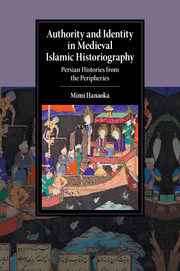Book contents
- Authority and Identity in Medieval Islamic Historiography
- Cambridge Studies in Islamic Civilization
- Authority and Identity in Medieval Islamic Historiography
- Copyright page
- Dedication
- Contents
- Preface
- Acknowledgments
- Journal and Reference Works Abbreviations
- 1 Introduction
- 2 Methodologies for Reading Hybrid Identities and Imagined Histories
- 3 Contexts and Authorship
- 4 Dreaming of the Prophet
- 5 Holy Bloodlines, Prophetic Utterances, and Taxonomies of Belonging
- 6 Living Virtues of the Land
- 7 Sacred Bodies and Sanctified Cities
- 8 Prophetic Etymologies and Sacred Spaces
- 9 The View from Anatolia
- 10 Lessons from the Peripheries
- Bibliography
- Index
- Series page
2 - Methodologies for Reading Hybrid Identities and Imagined Histories
Published online by Cambridge University Press: 05 August 2016
- Authority and Identity in Medieval Islamic Historiography
- Cambridge Studies in Islamic Civilization
- Authority and Identity in Medieval Islamic Historiography
- Copyright page
- Dedication
- Contents
- Preface
- Acknowledgments
- Journal and Reference Works Abbreviations
- 1 Introduction
- 2 Methodologies for Reading Hybrid Identities and Imagined Histories
- 3 Contexts and Authorship
- 4 Dreaming of the Prophet
- 5 Holy Bloodlines, Prophetic Utterances, and Taxonomies of Belonging
- 6 Living Virtues of the Land
- 7 Sacred Bodies and Sanctified Cities
- 8 Prophetic Etymologies and Sacred Spaces
- 9 The View from Anatolia
- 10 Lessons from the Peripheries
- Bibliography
- Index
- Series page
Summary
- Type
- Chapter
- Information
- Authority and Identity in Medieval Islamic HistoriographyPersian Histories from the Peripheries, pp. 13 - 35Publisher: Cambridge University PressPrint publication year: 2016



